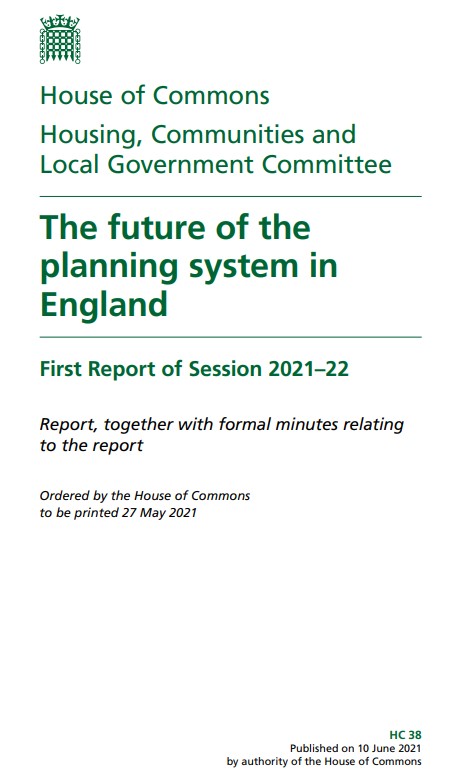The future of the planning system in England

|
Contents |
[edit] Introduction
Following an inquiry in 2020, the HCLG Committee has published a report expressing concerns over the lack of detail in the Government’s vision for the future planning system in England. ICE submitted evidence to the inquiry, which is cited throughout the report, noting the importance of collaborative strategic infrastructure planning at cross-boundary level.
[edit] What does the report say?
Above all, the committee says that there is a need for more information about how the Government's proposed reforms would work.
While the primary concerns of the committee centre around the newly proposed zonal planning approach, it also highlights the omission of various important issues relating to the non-housing elements of the planning system.
It’s particularly encouraging that the committee agrees with ICE that the Duty to Cooperate – which requires cooperation between local planning authorities and other public bodies – should not be abolished without an effective replacement being in position.
The committee goes even further than this, recommending that the Government should give combined authorities statutory powers to oversee the collaboration of local authorities in their area until the Duty to Cooperate is replaced.
When it comes to funding, the committee is unconvinced about the case for a proposed single Infrastructure Levy replacing both Section 106 and the Community Infrastructure Levy (CIL).
While it finds that a new levy could replace CIL and improve land value capture, the removal of Section 106 risks jeopardising the delivery of both infrastructure and affordable housing.
This aligns with ICE’s submission, which outlined that the binding nature of Section 106 agreements provides vital upfront contributions that mitigate against the impacts on communities that major projects inevitably have.
The Government’s 300,000 homes per year target also comes under scrutiny, with the report sceptical that this can be delivered. The committee recommends that the Government should publish the evidence behind the target and set out how it can achieved, breaking down the target both by tenure and location.
[edit] What is missing?
The report cites evidence from multiple organisations, including ICE, that the lack of sub-national planning weakens the planning system and the long-term development of areas.
No concrete recommendations on addressing this are put forward, but it is encouraging that the committee considers longer-term reforms in this area are needed, including potential joint plans that are overseen by mayors and combined authorities.
The need for sub-national planning is something ICE has explored. Integrated regional housing and infrastructure strategies that are evidence-based, have cross-authority agreement and go beyond individual political cycles mean that infrastructure for housing can be planned in a far more strategic way.
Such strategies could be developed by widening the remit of sub-national transport bodies (STBs) to include all economic infrastructure sectors. STBs are focused on place-based outcomes, so improving this part of the planning system would facilitate a more integrated approach to housing and infrastructure provision at both a regional and local level.
[edit] Why are the committee’s findings important?
As outlined in the Queen’s Speech of May 2021, the Government will, by June 2022, look to introduce a Planning Bill that puts its proposals into legislation.
While the committee states that it welcomes efforts to improve the 2021 planning system, it's unconvinced that the proposals will produce a quicker, holistic, more effective planning system. With the bill due to be introduced in the near future, time is of the essence to ensure the reforms deliver the right outcomes.
As a result, the committee is calling for the Government to explore the impact of its reforms across a variety of areas, stating that housing cannot be treated in isolation.
These areas include the levelling-up agenda, economic recovery from COVID-19, addressing climate change, improving sustainable transport provision and the delivery of economic infrastructure such as energy networks.
ICE fully agrees with the need to look at the bigger picture. As outlined in our 2019 State of the Nation report, infrastructure must be considered more strategically within the planning system instead of seeing it as something that comes about as a consequence of development.
This article originally appeared on The Infrastructure Blog portion of the ICE website under the headline, '"Housing cannot be treated in isolation from wider infrastructure," says HCLG committee'. It was written by David Hawkes, ICE Lead Policy Manager and published on 11 June 2021.
--Institution of Civil Engineers
[edit] Related articles on Designing Buildings
Featured articles and news
Call for greater recognition of professional standards
Chartered bodies representing more than 1.5 million individuals have written to the UK Government.
Cutting carbon, cost and risk in estate management
Lessons from Cardiff Met’s “Halve the Half” initiative.
Inspiring the next generation to fulfil an electrified future
Technical Manager at ECA on the importance of engagement between industry and education.
Repairing historic stone and slate roofs
The need for a code of practice and technical advice note.
Environmental compliance; a checklist for 2026
Legislative changes, policy shifts, phased rollouts, and compliance updates to be aware of.
UKCW London to tackle sector’s most pressing issues
AI and skills development, ecology and the environment, policy and planning and more.
Managing building safety risks
Across an existing residential portfolio; a client's perspective.
ECA support for Gate Safe’s Safe School Gates Campaign.
Core construction skills explained
Preparing for a career in construction.
Retrofitting for resilience with the Leicester Resilience Hub
Community-serving facilities, enhanced as support and essential services for climate-related disruptions.
Some of the articles relating to water, here to browse. Any missing?
Recognisable Gothic characters, designed to dramatically spout water away from buildings.
A case study and a warning to would-be developers
Creating four dwellings... after half a century of doing this job, why, oh why, is it so difficult?
Reform of the fire engineering profession
Fire Engineers Advisory Panel: Authoritative Statement, reactions and next steps.
Restoration and renewal of the Palace of Westminster
A complex project of cultural significance from full decant to EMI, opportunities and a potential a way forward.
Apprenticeships and the responsibility we share
Perspectives from the CIOB President as National Apprentice Week comes to a close.






















